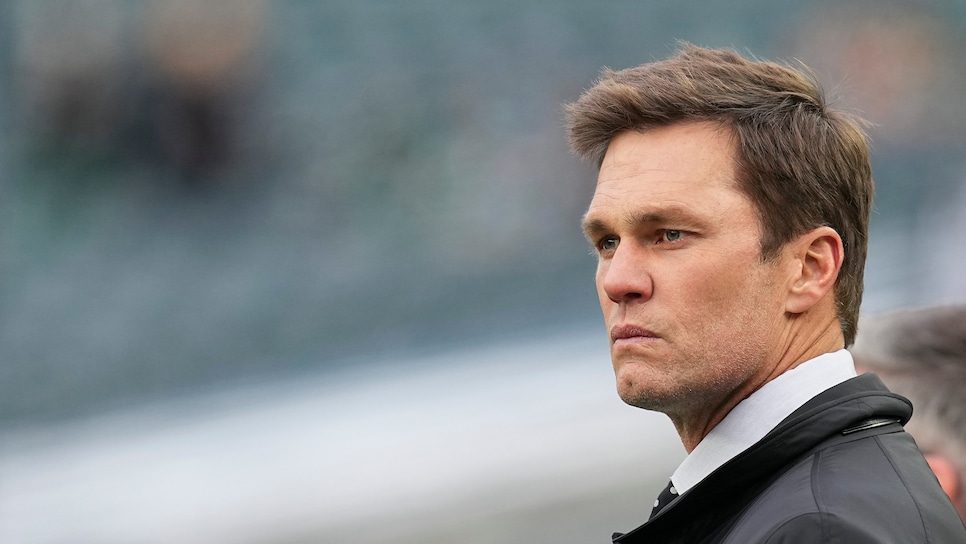The first thing I’d like to say here is that I’m grateful Tom Brady took the time to respond to Scottie Scheffler in his newsletter on Wednesday. High-level athletes reflecting on the deeper parts of life is exactly what journalists and fans should want, because it breaks the monotony of rote answers and boring platitudes that make up so much of the discourse. It is also, on its own merits, a piece of writing with some truly compelling introspection and insight. As you see from the headline, I think Brady doesn’t quite grasp what Scheffler was saying, and in that misunderstanding attributes to him a youthful naïveté that isn’t accurate, but he wrote with respect, and I hope in a small peripheral way I’m “participating” in that conversation with similar respect, and not attacking him in a way that makes these conversations less likely to happen in the future. That may seem like a wishy-washy preamble, but anyway, it’s important to me.
The relevant piece of background here is Scottie Scheffler’s remarks at the Open Championship a couple weeks ago in which he spoke about how the “euphoric feeling” he gets from winning never lasts very long, and how true satisfaction has to come from somewhere else. I wrote about it here, and if you want to read the original text, it begins in the third paragraph from the bottom in this transcript. What I found so fascinating about it—and what will be a key component of my argument—is that despite the catchy headlines (“Scottie doesn’t feel fulfilled!”) and the sometimes hilarious memes (Emo Scottie), he made it clear that he knew exactly how to handle that fleeting satisfaction, and how to view it in the context of his life.
In short: He knows that victory is underwhelming, but—this is the critical part—he doesn’t seem to regret it. Instead, he treats victory’s temporary glow as the natural order of things, and it only contributes to a humility that appears sincere. And what would absolutely terrify me, if I were one of his opponents, is that the anticlimax of winning has done nothing to diminish his intense competitive drive or his unshakeable love of the work needed to become great. The biggest error people made in interpreting his words, including Brady, is that we were witnessing a crisis of faith. That wasn’t remotely true—if anything, it sounded to me like a deepening of commitment. Yes, winning isn’t as fun or life-changing as you wanted it to be, but it doesn’t really bother him, because the fire inside him was never about a mere celebration.
On to Tom Brady. In the post titled “Your actions reflect your priorities,” it isn’t long before he identifies in Scheffler’s words “a young athlete trying to make sense of success without the benefit of the perspective that comes with years of experience.” With respect to Brady, I think this is the precise moment where he veers off course. In some sense, yes, Scheffler was questioning certain aspects of his life, particularly the competitive fire that burned inside him—why do I want to win this tournament so bad?—but to my ears, he has absolutely no problem “making sense of success.” In fact, as someone who is younger than Brady but much closer to his age than Scheffler’s, it sounds to me like Scheffler has an outlook that belies his 29 years. You don’t need to be a high-level professional athlete to understand that achieving your worldly goals won’t bring inner fulfillment, but Scheffler has seemingly solved the riddle of understanding where his deeper satisfaction comes from without losing the drive to excel at the thing he’s best at in the world. At the risk of repeating myself, I can’t emphasize this point enough—the ephemeral quality of victory doesn’t bother him.

Mitchell Leff
Brady goes on to describe himself at age 27, a three-time Super Bowl winner who was searching for something deeper and floundering.
“The lessons came in stages,” he writes. “First, that there is more to life than playing football and winning championships. Then I learned exactly what those other things were. Then, I learned how they all fit together so that what I did on the field supported the things I did off the field, and vice versa. And finally, most importantly, I learned that it was the pursuit of excellence in each of these areas where I found the most joy, not in the achievements themselves. It was the process, not the outcome.”
Brady presents this as the epiphany that Scheffler needs to find in his own life, but the thing is, this is exactly what Scheffler was already saying. Seriously—here are his own words after that Open victory, while explaining the original comments.
“I don’t know why I’m so lucky that I get to live out my dreams, but it’s something I’m very grateful for,” he began. “Yeah, this is amazing to win the Open Championship, but at the end of the day, having success in life, whether it be in golf, work, whatever it is, that’s not what fulfills the deepest desires of your heart. Am I grateful for it? Do I enjoy it? Oh, my gosh, yes, this is a cool feeling…but at the end of the day, it doesn’t fulfill the deepest desires of my heart.”
To Brady’s point, he already knows it’s the pursuit that gives him the most satisfaction professionally, and he further knows that it’s other elements of life—family and faith, for him—that bring a deeper sense of well-being. Brady is trying to tell him what he already knows.
In the third section of his essay, titled “Lesson,” Brady describes his priorities like a pyramid, with himself on top, a partner in the middle, followed by children, then work, then hobbies and community. These are priorities, he says, and they’re constantly shifting.
“That is the question it seems Scottie Scheffler is wrestling with,” Brady writes. “Do I have my priorities straight?”
Yet again, I think he’s arrived at the wrong conclusion. What was most astounding about Scheffler’s monologue, and his follow-up, is that his priorities were absolutely ironclad.
“I would say my greatest priorities are my faith and my family,” Scheffler said. “Those come first for me. Golf is third in that order. I’ve said it for a long time, golf is not how I identify myself. I don’t identify myself by winning tournaments, chasing trophies, being famous or whatever it is.”
Brady fell prey to a superficial reading of what Scheffler was saying, and came away with the impression of a golfer in crisis, and he wasn’t alone in making that mistake. But Scheffler is not Hamlet. It doesn’t take an especially deep reading of his remarks to understand that his foundation is ironclad. In fact, where Brady’s description of a pyramid ends up being muddled—the point of a pyramid is that the base supports the top, not that the structure shifts—Scheffler, without using the word, has constructed a rock-solid pyramid of priorities.
Brady continues:
“As part of his answer at Media Day, for example, Scottie said he’d rather be a better father and husband than a good golfer. And my question is: why are those mutually exclusive? Sure, they’re different blocks on the pyramid, but they’re part of the same pyramid. They’re connected!”
He knows, Tom! And with respect, he’s locked down that balance in a pretty impressive way. Again, we can reference the man himself for evidence.
“I love playing golf,” he said at the Open. “I love being able to compete. I love living out my dreams. I love being a father. I love being able to take care of my son. I love being able to provide for my family out here playing golf. Every day when I wake up early to go put in the work, my wife thanks me for going out and working so hard. When I get home, I try and thank her every day for taking care of our son.”
For someone trying to manage an absurd level of fame and success in a media-saturated culture, this has all the appearance of a very healthy outlook. And while Scottie may not have said it explicitly, it’s also clear that he sees his hard work as an example for his son. It’s just that he doesn’t attach that example to golf.
The fourth and final part of Brady’s essay, “Application,” is a beautiful reflection on his own path, and where he has found satisfaction. Brady’s journey is more interesting to me than Scheffler’s, and also more relatable, because where Scheffler seems to have been blessed with an inherent sense of stability that has let him adapt to fame and success with relative ease, Brady’s path wound through uncertainty and dissatisfaction and painful searching. (It’s also more useful for those of us for whom Christianity isn’t one of the bedrock answers.) In all, I think there is more to learn from Brady for those of us who don’t have Scheffler’s natural constancy…which is most of us.
“Whatever level of satisfaction you are trying to achieve with your professional accomplishments,” he writes, “it will almost never come in the moment, and it will sometimes take years before you find full appreciation and gratitude for it.”
That, and what follows, represents a wonderful, hard-earned perspective on his own life. His other lesson about the pursuit, that “there is no one aspect of life that is so all-encompassing that it will provide the satisfaction you are looking for,” is equally well-taken. His mistake, though, is in thinking Scheffler doesn’t already know it. He does, and he said as much. To talk about his words at the Open necessarily requires that we see them for what they are—not the very human crisis that Brady endured over a period of years, but as a precocious sense of self that has allowed him to arrive at difficult conclusions faster than all his contemporaries. That’s the cornerstone of his athletic greatness, and it demands to be understood on its own unique terms.
This article was originally published on golfdigest.com




